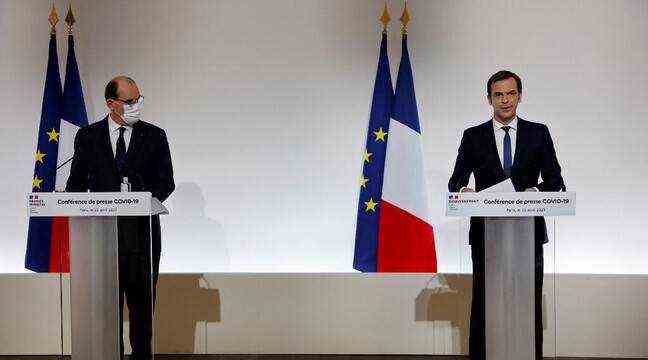Coronavirus: Schools, travel … Jean Castex makes several announcements – 20 minutes
“The peak of the third wave seems to be behind us, but we have to remain vigilant. “The Prime Minister, Jean Castex, took the floor this Thursday evening, and drew up” the perspectives which emerge for the coming weeks “in terms of the fight against Covid-19 in France.
The Prime Minister indicated that “the health situation is improving”, with a “real drop” in viral circulation and a “plateau in hospitalizations, which gives hope for the start of a reflux within a few days”. However, these figures are more or less marked according to the departments, Jean Castex therefore reiterated the importance of “remaining lucid on the situation, and fully mobilized”.
Return to class “in the most protective health environment possible”
He “confirmed the resumption of school lessons from next week”, with a return to class for nursery and primary from April 26, for colleges and high school from May 6. The colleges located in the areas most affected by the epidemic will experience a return to half-gauge, such as high schools, said the Minister of Education, Jean-Michel Blanquer.
“We will close the class as soon as there is a case of contamination,” said the minister, who judged “much preferable to have 1% of classes in France which close than to have 100% of schools” closed. . He also announced that the baccalaureate, patent, BTS or oral admission exams to the grandes écoles would be maintained in person.
Jean Castex added that this re-entry would be done “in the most protective health framework possible”, with “a very strict protocol” and “a massive reinforcement” of the tests. Thus, 400,000 saliva tests will be available per week, with a concentration in the departments where the incidence is the highest. And the goal is to reach 600,000 per week by mid-May.
In addition, 64 million self-tests were ordered for national education staff and then high school students from May 10. The Prime Minister specified that the latter were for the time being reserved for over 15 years, but that the High Authority of Health (HAS) would give an opinion next week to also benefit the younger populations.
14 million people vaccinated
Regarding vaccination, “by the end of the week, 14 million people will have received a first dose of vaccine, or a quarter of the adult population”, welcomed Jean Castex, specifying that the majority of vulnerable people had been vaccinated: “Almost 100% in nursing homes, 70% of over 75s, 70% of health professionals received a first dose”. The Prime Minister stressed that vaccination would be open to priority personnel, whose list had been established after consultation meetings with the social partners.
He confirmed that the objective was still the same: “To offer vaccination to all by the end of the summer”, with 20 million French people having received a first injection in mid-May and 30 million in mid-June. . To do this, 7 million additional Pfizer doses must be delivered between mid-May and the end of June, he announced.
Finally, the Prime Minister as well as the Minister of Health, Olivier Véran, returned to the AstraZeneca vaccine, with “extremely rare” adverse effects, and whose effectiveness has been “reaffirmed” by the HAS and the European Medicines Agency. (EMA). Jean Castex recalled that it was now reserved for over 55s, and that some 11 million people in this age category have not yet been vaccinated.
A return to normal “in stages, in a careful and gradual manner”
“We all aspire” to return to a normal life, said Jean Castex, confirming that the government wants it to start around mid-May, as Emmanuel Macron announced at the end of March. This return will be done “in stages, in a cautious and progressive manner”, and in respect of barrier gestures, possibly on a territorial basis, he indicated, presenting the envisaged reopening schedule.
The latter is as follows: lifting of travel constraints during the day on May 3, then a new train of reopening in mid-May, which could concern “shops, certain sports activities, terraces”, he listed. , specifying that the list had not yet been fixed. The curfew will also be maintained at least until mid-May.
Quarantine for arrivals from five countries
Finally, Jean Castex and the Minister of the Interior, Gérald Darmanin, evoked the subject of borders, the Prime Minister stressing that “the appearance of new variants justifies further tightening” the conditions for entry into the territory. As of Saturday, the control system will therefore be reinforced with a quarantine of 10 days for “all” passengers from Brazil, Chile, South Africa, Argentina and India “decided by prefectural decree. “, And” whatever the result of their test, positive or negative “upon arrival in France, said Gerald Darmanin. These measures will also be applied to travelers from Guyana where the Brazilian variant is spreading rapidly.
This “quarantine decree will apply instead of the commitment to respect a 7-day isolation that must be taken today by travelers arriving in France”. The latter, he continued, will have to justify on their arrival of a “PCR test of less than 36 hours”, and will be “systematically” tested again by an “antigen test”. The minister affirmed that the controls of these quarantines would be “reinforced”, in order to complete this “sanitary lock”.

